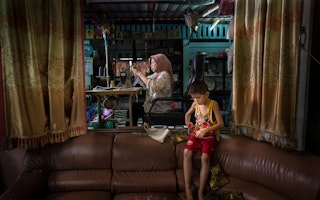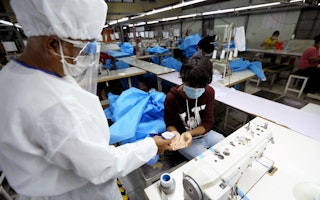Q&A: How Migrant Women in the UK Are Joining Together in the Era of COVID-19

London’s Latin American Women’s Rights Service is a grassroots charity that supports Latin American migrant women displaced by poverty and violence. Recently, Open Society’s Megan Wong spoke to the organization’s director, Gisela Valle, about the ways the coronavirus pandemic has affected its work.
What does the Latin American Women’s Rights Service do?
Latin Americans are one of the fastest growing ethnic minorities in Britain, but the community remains largely invisible—with migrant women, who are often overrepresented in unregulated sectors of employment, living in precarious housing particularly at risk. Our mission is to provide these women with the tools they need to assert their rights and adjust to their new circumstances.
Alongside advocating for their interests—and empowering them to do the same for themselves—we directly support over 5,000 women annually, largely by providing them with advice, information, counseling, psychotherapy, development programs, and workshops.
How has the pandemic affected your work?
The pandemic has made many of the challenges this community is facing even worse.
During the United Kingdom’s first nationwide lockdown, for example, many of the women we work with lost their jobs or saw their wages withheld by their employers; care workers were forced to isolate with their employers, and many had no choice but to work in unsafe conditions at a time of a public health crisis. We know that many women were trapped with their abusers during lockdown with little possibility of safely accessing support and others too afraid to speak out. What happens if your immigration status depends on the person abusing you? You stay silent.
Sometimes, perpetrators took unnecessary health risks putting survivors and their children at higher risk of infection in order to continue controlling them. Unsurprisingly, this had a marked effect on mental health, particularly for women experiencing gender-based violence and employment rights violations. Many cases required crisis intervention and saw a surge in demand for counseling and psychotherapy services.
Has the current government been helpful?
No. Unfortunately, overall, they’ve made it even more difficult for us to do our work. Despite the pandemic, the government continued their hostile environment policies. Many migrant women have limited access to services because of the United Kingdom’s no recourse to public funds policy and fear around of data sharing with immigration enforcement.
What is the no recourse to public funds policy?
This policy applies to people who are “subject to immigration control” and, as a result, have no entitlement to many welfare benefits—including income support, homelessness assistance, and a range of allowances and tax credits—because of the nature of their immigration status.
Those who are subject to the no recourse to public funds policy can get assistance from their local authorities for a range of services, including education and social care. But the truth is that it’s not so simple as that, really, because some migrants fear local authorities will share their details with the government’s Home Office—which has the power to deport individuals.
Does this policy disproportionately affect migrants?
Yes. According to research conducted by the Migration Observatory at the University of Oxford for the nongovernmental organization Citizens Advice nearly 1.4 million people in the United Kingdom are subject to the no recourse to public funds rule.
The problem is particularly acute when it comes to women experiencing domestic violence or abuse without recourse to public funds. They are unlikely to seek support or medical help for fear that their data will be shared with immigration enforcement. They also face cultural and language barriers and find it even harder to ask or access help.
How have you addressed those concerns?
During the first pandemic-related lockdown, our organization wrote to the Home Office to demand an immediate suspension of the no recourse to public funds condition. We believe that migrant women with insecure immigration status should still feel secure when accessing the vital, often lifesaving support they need.
How have you ensured continuity of care, despite the challenges created by the pandemic?
Despite our limited resources and increased demand, we never stopped providing services such as online psychotherapy services, generalist advice on benefits, housing and debt and employment rights, and practical support to women and girls experiencing domestic violence.
We diversified our outreach mechanisms, using printed and online materials to increase our reach vulnerable women in the community, working closely with our community activists to share translations, and using WhatsApp groups as a medium to share information and updates.
What are your plans for the future?
Alongside our partners in the women’s, migrants’, and workers’ movements, we are going to be pushing hard to make sure the public is aware of the intersectional nature of the harms inflicted by the pandemic. We want people to understand how the pandemic and the lockdowns—even though they’ve affected us all—have especially hurt the people who were the most vulnerable, marginalized, and exploited already. One of the ways we’re doing this is by raising the profile of migrant women in media, so that they can speak in their own voices about their experiences and needs.
That said, the fact is that we do not yet know the true scale of how the pandemic has affected migrant women in the United Kingdom. With this in mind, we intend to expand our online capabilities so that we can reach more women with a web chat function on our website. But we’re also going to provide a way for people to make sure their data and security is protected, too.
Last, but not least: We’re going to engage in face-to-face service (when it’s safe to do so, of course) because we want to make sure that people who may not have easy access to the internet are still getting help if they need it.
The Latin American Women’s Rights Service is a grantee of Open Society Foundations.


